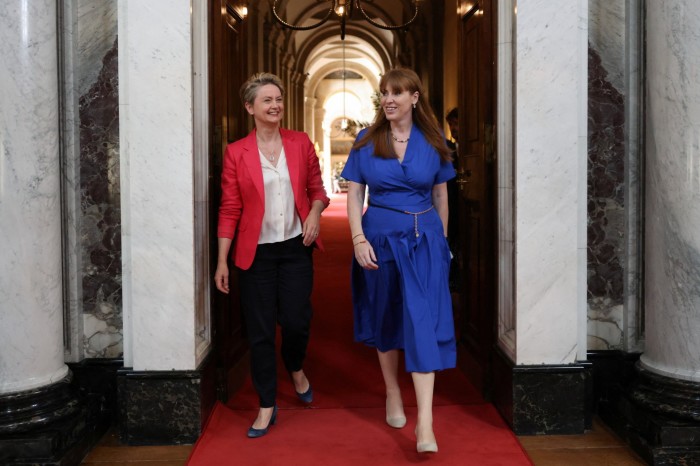Unlock the Editor’s Digest for free
Roula Khalaf, Editor of the FT, selects her favourite stories in this weekly newsletter.
Ministers are poised to confirm that the “vast majority” of new build homes in England will need to have solar panels on their roofs, claiming the policy will cut household energy bills.
The government will announce as soon as Friday that the “future homes standard” will require all new build homes to have solar panels and low-carbon heating — such as heat pumps — as well as high levels of energy efficiency, Whitehall figures told the Financial Times.
It comes as energy secretary Ed Miliband has reached a settlement with chancellor Rachel Reeves ahead of the spending review on June 11.
As part of that deal the Treasury has dropped proposals to cut a Labour election manifesto promise to spend £13.2bn in this parliament on home insulation and installing heat pumps and solar panels in large numbers of homes, government officials said.
The settlement with the Department for Energy Security and Net Zero leaves home secretary Yvette Cooper and Angela Rayner, housing secretary and deputy prime minister, as the last two cabinet ministers in serious negotiations with the Treasury.

Reeves’ comprehensive spending review — the first by a Labour government for 16 years — will set out day-to-day departmental spending for the next three years and capital budgets for the next four.
Government figures said there had been minimal progress in talks between the Treasury and the Home Office over the budget for policing. Meanwhile Rayner’s department is still in a tussle with the finance ministry over the fine details of the local government budget.
The Department for Science, Innovation and Technology and the Treasury are also wrangling over details of how money will be allotted in different baskets, rather than which projects would be funded, said two people briefed on the talks.
Meanwhile ministers are planning to announce next week that winter fuel payments will be made to all pensioners in England and Wales this winter before some of the subsidy is recouped from higher-earning individuals at the end of the tax year, according to people briefed on the plans.
Ministers were on Thursday still deciding which salary threshold should be used to determine who would have to repay the allowance, with one option under discussion being setting the threshold as the average level of real household disposable income — or about £37,000 — according to two of the people.
Prime Minister Sir Keir Starmer last month announced a U-turn on the government’s highly unpopular cuts to the payment, pledging to look at making changes “as part of a fiscal event”.
First announced by the previous Conservative administration, the future homes standard will not be published until later this year, but the government will clarify details around it as soon as Friday.
Ministers want to amend building regulations to promote solar for the first time, while excluding developments with minimal sun — for example next to woodland — from the obligation to add panels.
Ministers also intend to shake up the planning rules to allow more homeowners to install heat pumps by, for example, doubling the number of pumps allowed in each home from one to two.
An existing restriction that requires heat pumps to be at least one metre away from a neighbour’s property will be lifted on the basis that the technology has become quieter.
The standard is aimed at cutting energy bills and reducing emissions ahead of the 2050 net zero target, and the government will claim these upgrades will save households over £500 a year on average.
Research published last year by The MCS Foundation, which supports low carbon technology in Britain, found households living in an average semi-detached home could save up to £1,040 with solar panels and a heat pump.
The energy department and the housing ministry declined to comment on the future homes standard.
Separately government figures confirmed on Thursday that the government would not drop its manifesto pledge to spend an extra £6.6bn on its “warm homes” programme after weeks of negotiations with the Treasury.
The scheme offers grants and low interest loans to support investment in insulation and other improvements such as solar panels, batteries and low-carbon heating.
The decision, first reported by the Daily Telegraph, means the programme will have a budget of £13.2bn over the current parliament, double its previous figure, for upgrading millions of homes.
The £6.6bn figure is itself only one-fifth of an original Labour plan, which the party slashed back in early 2024 when it was in opposition.
The U-turn came after pressure from charities, industry and campaigners to keep the pledge as a key part of the UK’s attempts to hit its 2050 net zero target.
